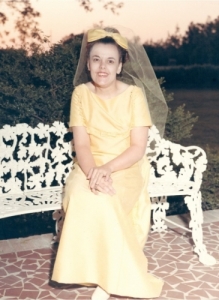Bequest to Wayne Community College will help disabled
By Phyllis Moore
Published in News on November 27, 2012 1:46 PM

Submitted photo
Jean Pearman, in this undated family photo, was born with cerebral palsy and overcame many hurdles, including relying on a wheelchair and being hospitalized for three years as a pre-teen. She went on to attend Wayne Community College and East Carolina University, before becoming a social worker at Cherry Hospital.
Jean Pearman grew up at a time when there were few provisions for the handicapped.
Born with cerebral palsy, she was confined to a wheelchair for the bulk of her life.
But that didn't stop her from attending Wayne Community College and East Carolina University and going on to become a social worker at Cherry Hospital.
In fact, the appreciation for her own education remained strong throughout her life.
And though she passed away Feb. 1, 2011, at age 71, her desire for others to have the same opportunities lives on in the form of a $168,000 endowment to Wayne Community College.
The bequest, laid out in her will, is earmarked to benefit physically handicapped students for such purposes as scholarships, adaptive equipment and facilities improvements. She also apportioned a similar donation to East Carolina University School of Social Work, plus $20,000 to St. Mary Catholic School and $2,000 to the Forgotten Patients Fund at Cherry Hospital.
"I think what she wanted to do was ease others' (burden) by allowing us to try to eliminate as many of the obstacles as we could," said Jack Kannan, executive director of the Foundation at WCC. "That is why our local community college is so important.
"We normally talk work force preparedness, but look at her. Her mind wasn't handicapped."
"It's such a great story of someone who had a very serious handicap and was very successful in overcoming it and was grateful to the institutions," added Phil Baddour, local attorney and executor of her will.
Kannan and Baddour were also classmates of Ms. Pearman and her younger brother, William, who still lives in Goldsboro. They all attended St. Mary and Goldsboro High School together, graduating in 1960.
Ms. Pearman was actually three years older than they were, her brother said.
"She started at St. Mary because public school would not let her in at the time," he said. "She was also the first patient admitted to what is now called Lenox Baker Children's Hospital in Durham."
As a pre-teen, she would spend three years at the former Cerebral Palsy Hospital, he said.
"When she came back, I was in the sixth grade," Pearman said. "She did not progress with schooling as fast at the hospital. Mother had her put in the same grade as me so that I could help her in school."
The siblings made a lasting impression, said Kannan.
"William was always there for her and when we saw Jean, we saw William. He never complained," he said. "And her attitude -- in the probably 55 years I have known her, I've never seen or known her to raise her voice. She just made the most of her life."
Kannan called her a "pioneer" in the era before the American Disabilities Act, as she didn't allow limitations to keep her from attending school and carving out a career.
These days, college campuses have more options in place to support such students.
Deana Holland, disability services counselor at WCC, said her department tries to make accommodations for students that require them.
"Our main purpose with disability services is to make sure that all students have equal access while they're a student here," she said. "For instance, a student in a wheelchair, I really hear very little from those students because they have kind of learned how to manipulate and take care of themselves.
"But it might be that they have a problem with a schedule, getting from class to class on time."
An endowment like Ms. Pearman's can be used for a variety of things that aren't otherwise covered by financial aid.
"We have large-print keyboards for students with visual impairment, talking calculators, we have magnifiers for the screen and we have audio books or we can order audio books for those with visual impairments, and have equipment that plays those CDs," she said. "The big benefit has been to help with tuition.
"I talk with people on occasion, they fall between the cracks of eligibility for financial assistance."
Kannan and Mrs. Holland said there are plans to meet with other faculty, staff and students to discuss other ways the endowment may be applied.
"It primarily will be used for tuition and special equipment that may be needed, like an adapter for a computer, and there's no money for that," Kannan said. "We'll try to let the principal (on the endowment) grow and use the interest. But we will not let a student that has a need go without if we need to use the money."
